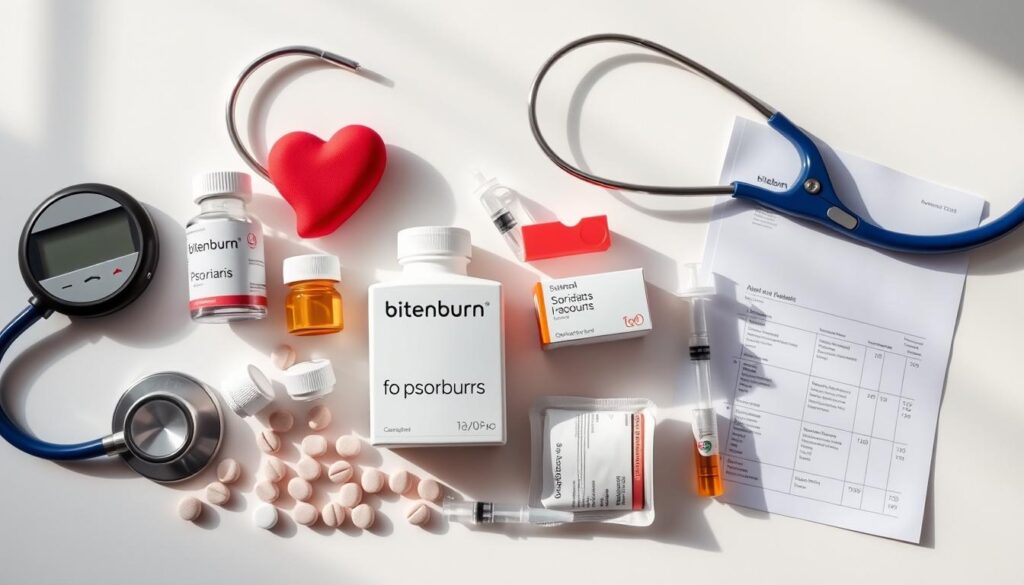Did you know people with psoriasis are 58% more likely to have heart attacks than those without it? This shows how important it is to look at how psoriasis treatments affect our hearts. Psoriasis is a chronic skin condition that affects over 8 million Americans.
It often needs treatments that can affect our heart health. By understanding how psoriasis treatments and heart health are connected, we can make better choices. This helps us manage our skin condition without harming our heart.
Key Takeaways
- Psoriasis patients have a significantly higher risk of cardiovascular events.
- Effective psoriasis therapy can have both positive and negative impacts on heart health.
- Managing psoriasis with topical treatments, systemic medications, and phototherapy requires consideration of cardiovascular implications.
- Regular cardiovascular health monitoring is essential for those undergoing psoriasis treatment.
- Understanding the link between inflammation, psoriasis, and heart disease is crucial for holistic health management.
Introduction: Understanding Psoriasis and Cardiovascular Health
Exploring the link between psoriasis and heart health is key. Psoriasis not only affects the skin but also the heart. It’s important to look at both areas closely.
What is Psoriasis?
Psoriasis is a long-term autoimmune disease. It causes skin cells to grow too fast, leading to scaling, inflammation, and redness. The Journal of the American Academy of Dermatology lists different types of psoriasis, each with its own symptoms.
The Importance of Cardiovascular Health
Good heart health is essential for overall well-being. It affects energy levels and how long we live. The Centers for Disease Control and Prevention (CDC) shows heart health is key to preventing diseases and improving life quality. Without it, people face higher risks of heart attacks and strokes.
The Interrelation Between Psoriasis and Heart Health
The connection between psoriasis and heart health is real. Studies show a link between psoriasis treatment and heart disease. Psoriasis inflammation can harm the heart, leading to serious conditions. It’s crucial for patients and doctors to understand this to provide complete care.
Common Psoriasis Treatments

Psoriasis is a chronic skin condition that can greatly affect a person’s life. Many treatments are available to manage its symptoms. Each treatment has its own effects on heart health.
Topical Treatments
Topical medications are often used to treat psoriasis. These include corticosteroids, vitamin D analogs, and retinoids. They are applied directly to the skin.
These treatments are usually the first choice for mild to moderate psoriasis. While they are generally safe, they can cause side effects. These include skin thinning and the risk of systemic absorption, which might slightly affect heart health over time.
Systemic Medications
For severe cases of psoriasis, systemic medications are used. These include oral medications like methotrexate and cyclosporine, as well as biologic drugs. Systemic medications can be very effective but have more side effects.
Research shows that some systemic treatments may reduce body inflammation. This could help heart health by addressing inflammation common in both psoriasis and heart diseases.
Phototherapy
Phototherapy uses ultraviolet (UV) light to treat psoriasis. It reduces inflammation and slows skin cell production. This treatment is effective for moderate to severe cases.
While generally safe, UV light exposure can increase skin cancer risk. Studies show minimal direct impact on heart health.
Understanding the effects of psoriasis treatments on heart health is key to making better choices. Below is a comparison of common treatments and their characteristics.
| Treatment Type | Examples | Method | Cardiovascular Health Considerations |
|---|---|---|---|
| Topical | Corticosteroids, Retinoids | Applied directly to the skin | Minimal, primary local effects |
| Systemic | Methotrexate, Biologics | Oral or injection | Potential cardiovascular benefits by reducing inflammation |
| Phototherapy | UVB Light, PUVA | Light exposure | Minimal direct impact, risk of skin cancer |
Impact of Topical Treatments on Cardiovascular Health
Topical treatments are often the first choice for psoriasis because they target the skin directly. But, it’s key to know how they might affect the heart and blood vessels. Knowing this helps doctors take care of patients in a more complete way.
Effects on Blood Pressure
Studies show that topical treatments can affect blood pressure, even though they’re applied locally. Corticosteroids, for example, can cause the body to hold onto sodium and water. This can raise blood pressure. So, it’s important for people using these treatments to have their blood pressure checked often.
Potential Side Effects
Even though topical treatments are usually safe, they can have side effects. These effects might not just be skin-related. For example, using strong corticosteroids for a long time can lead to high blood pressure and heart problems. The FDA has listed possible side effects like swelling in the legs and an increased heart rate.
Knowing how topical treatments can affect the heart and blood vessels helps doctors choose the right treatments. This ensures that patients get the best care for their psoriasis and stay safe from heart problems.
The Role of Systemic Medications in Heart Health

Systemic medications have changed how we treat psoriasis, helping those with severe cases. It’s important to know how they affect heart health. This knowledge helps us make better choices.
There are two main types of systemic medications: biologic drugs and oral treatments. Each works differently and affects the heart in unique ways. We must think carefully about these effects.
Biologic Drugs
Biologic drugs aim at specific parts of the immune system to fight inflammation and psoriasis. Drugs like adalimumab and secukinumab have been studied for safety. Yet, we can’t ignore their possible effects on the heart.
- Adalimumab: Some studies suggest it might slightly raise the risk of heart problems, mainly in those with heart issues already.
- Secukinumab: It doesn’t seem to increase heart risks as much as some other biologics, making it safer for those at high risk.
Oral Systemic Treatments
Oral treatments, like methotrexate and acitretin, affect the whole body. They are effective but need close watch due to heart health risks.
Guidelines stress the need for regular check-ups to catch and manage side effects:
| Drug | Cardiovascular Effects | Recommendations |
|---|---|---|
| Methotrexate | May decrease cardiovascular events by reducing systemic inflammation. | Regular monitoring of liver function and cardiovascular risks is recommended. |
| Acitretin | Can increase lipid levels, potentially elevating cardiovascular risk. | Frequent lipid profile tests and cardiovascular evaluations are essential. |
In summary, systemic medications are effective against psoriasis but need careful monitoring for heart health. Finding the right balance between treating psoriasis and protecting the heart is crucial for the best results.
Phototherapy and Its Cardiovascular Implications

Phototherapy is a common way to manage psoriasis. It uses UV light to reduce inflammation and slow skin cell growth. It’s important to look at how it affects heart health for complete patient care.
Studies at dermatology conferences show phototherapy has little direct harm on heart health. But, we need to see it in a bigger picture, focusing on psoriasis therapy impact on heart health.
Recent research looks into how phototherapy might affect heart health indirectly. UV light can change blood pressure and heart risk factors. But, the full effect of this treatment is still being studied.
Here’s a comparison of phototherapy with other psoriasis treatments and their heart health effects:
| Treatment Type | Cardiovascular Implications |
|---|---|
| Phototherapy | Minimal direct impact, but ongoing research on indirect effects |
| Topical Treatments | Generally safe, rare instances of blood pressure changes |
| Systemic Medications | Possible increase in cardiovascular risks, needs close monitoring |
As we explore psoriasis treatments, like phototherapy, we must keep evaluating. This helps us understand its full impact on heart health.
Inflammation: A Common Link

Inflammation plays a big role in both psoriasis and heart health. This section explores how it works in these areas.
The Role of Inflammation in Psoriasis
Psoriasis happens when the immune system gets too active. This makes skin cells grow too fast. It’s like an autoimmune fight that never stops.
Studies show that people with psoriasis have high levels of inflammatory markers. These include cytokines. This means fighting inflammation is key to treating psoriasis.
Inflammation’s Impact on Heart Health
Heart health is also affected by inflammation. It can lead to the buildup of plaques in arteries. This increases the risk of heart disease.
People with psoriasis should know this. They might need to manage their inflammation to protect their heart. This is important for their overall health.
The Link Between Psoriasis Treatment and Heart Disease
The connection between psoriasis treatments and heart disease is a big topic in medicine. This part looks into the link between psoriasis treatment and heart disease. It shares important research and case studies.
Research Findings
Recent studies show a strong link between psoriasis treatment and heart disease. Research from top institutions has been published in journals like the Archives of Dermatology. It shows how psoriasis meds can affect heart health.
For example, biologic drugs help control psoriasis but might also affect the heart.
Case Studies
Case studies from patient records show how psoriasis treatment can lead to heart problems. For example, some patients on systemic meds had high blood pressure and high cholesterol. These cases highlight the importance of balancing psoriasis treatment and heart health.
Research and case studies together give us a better understanding of the link between psoriasis treatment and heart disease. This helps doctors make better choices for their patients’ health.
How Psoriasis Treatments Affect on Cardiovascular Health

The link between psoriasis treatment and heart health is very important. Knowing the long-term effects and managing side effects well can greatly improve patients’ lives.
Long-term Implications
Studies show that psoriasis treatments can affect the heart in many ways. Some treatments help with psoriasis but might harm the heart over time. For example, biologics can have mixed effects on heart health.
Managing Side Effects
It’s key to handle the side effects of psoriasis treatments to protect the heart. The American Academy of Dermatology offers helpful tips for managing these side effects. They suggest regular check-ups and making healthy lifestyle choices like eating well and exercising often.
Monitoring Cardiovascular Health During Psoriasis Treatment

Managing psoriasis treatments means keeping an eye on heart health. It’s important to check blood pressure and cholesterol levels regularly. This is because psoriasis treatments can affect the heart.
Regular Check-ups
Regular visits to the doctor are key to watching out for heart risks from psoriasis treatments. The American College of Cardiology suggests regular checks to catch any heart problems early. These visits can lead to changes in treatment to improve health.
Monitoring Blood Pressure and Cholesterol Levels
It’s vital to keep an eye on blood pressure and cholesterol levels. This helps understand how psoriasis treatments might affect the heart. Health experts recommend tracking these to avoid heart problems. Regular checks can help catch issues early and prevent heart disease.
The table below shows how often to check these important health markers:
| Cardiovascular Indicator | Monitoring Frequency | Suggested Actions |
|---|---|---|
| Blood Pressure | Every 3-6 months | Adjust medications as necessary |
| Cholesterol Levels | Annually | Implement lifestyle changes; consider lipid-lowering therapy |
Being proactive about heart health is crucial when treating psoriasis. This approach helps manage the risks of psoriasis treatments. It ensures overall well-being and reduces potential heart risks.
Conclusion
Understanding the link between psoriasis treatment and heart health is key for both patients and doctors. This deep dive shows how different treatments for psoriasis affect heart health. It reveals the strong connection between skin and heart health.
Inflammation plays a big role in both psoriasis and heart diseases. This makes managing treatments tricky. Studies and real-life examples show why we need to watch closely and act fast to protect the heart.
Regular check-ups and keeping an eye on blood pressure and cholesterol are crucial. They help a lot in keeping the heart healthy while dealing with psoriasis. By taking a whole-body approach, we can improve both skin and heart health together.


[…] risks. The anti-inflammatory diet for psoriasis isn’t just about skin—it’s a lifeline for your heart too. This guide breaks down how foods like salmon, berries, and olive oil fight inflammation at its […]
[…] studies have shown that high levels of visceral fat increase the risk of cardiovascular disease, type 2 diabetes, and even certain cancers. This type of fat is metabolically active, […]
[…] you know over 40% of people with psoriasis say stress makes their symptoms worse? If you’re having trouble controlling your psoriasis, […]
[…] with psoriasis get flare-ups on their elbows? This makes simple tasks like buttoning shirts hard. Psoriasis affects millions, but many find relief in natural […]
[…] psoriasis is a chronic skin condition that leads to red, scaly patches on the scalp. These symptoms can be […]
[…] reveal how skin inflammation can signal deeper health risks. People with severe psoriasis may face a 50% higher psoriasis cardiovascular risk than those without […]
[…] Heart health and joint function may be impacted by this condition. […]
[…] complement other lifestyle efforts. From plant-based blends to antioxidant-rich teas, each supports cardiovascular health through unique mechanisms. Best of all, they fit seamlessly into evening routines—no drastic […]
[…] key lipoproteins determine cardiovascular risks. LDL cholesterol acts like sticky delivery trucks, depositing plaque in artery walls. HDL […]
[…] benefits: Proper dosing improves metabolic and cardiovascular outcomes supported by […]